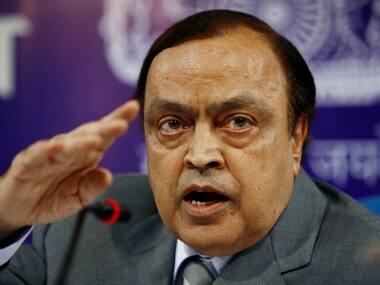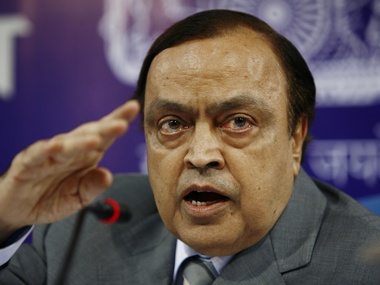Whether it was hobnobbing with the rich and famous of the city or traversing the power corridors of Delhi, Congress veteran Murli Deora was never out of place. And it was his ability to leverage his contacts from the world of business and politics that made him a formidable force and a valued asset to the Congress party. A graduate in economics, Deora built up a business using his own savings and according to
some accounts
even used his own money to fund his entry into politics, which began with his entry into Mumbai’s civic body with the poll in 1975 mentored by the then prominent politician Rajni Patel. Starting out as a municipal corporator, Deora was Mayor of Bombay between 1977-78, a position he is said to have utilised well to further increase his sphere of influence among the rich and famous of the country’s financial capital. He never missed a funeral, he visited everyone he knew if they ever took ill and had an ability to keep in touch with friends and contacts from across various spheres that would hold him in good stead during his political career. His ability to raise funds for the Congress from Mumbai was ’legendary’ by some accounts but unlike other leaders who frittered their goodwill by attempting to take advantage of it, Deora never did. [caption id=“attachment_1818313” align=“alignleft” width=“380”]
 Deora’s tenure as a minister ended under a cloud. Reuters image[/caption] Quick witted, helpful to a fault and an ability to maintain diplomatic ties with opponents at all times, Deora’s contacts cut across party lines and rarely allowed any rancour to fester against him. It perhaps explains why he was the head of the Mumbai unit of the Congress for 22 years and was elected four times from the Lok Sabha seat of Mumbai South, a seat in which he was considered a formidable opponent. His son Milind later contested from the seat, while Deora was content to take a seat in the Rajya Sabha where he served two complete terms and was in the process of serving a third term. Deora’s proximity to the Nehru-Gandhi family began while Indira Gandhi was the prime minister and it continued till the end. He is credited with introducing Rajiv Gandhi to the World Economic Forum and it is said that it was
reportedly
at a dinner at his residence in Mumbai in 1996 that Sonia Gandhi, who had till then shown little inclination towards politics, showed intent to enter the Congress. His proximity to the Gandhi family meant that few doors in Delhi could not be opened by him, a facet that more than a few of his industrialist contacts from Mumbai are credited with using. But Deora is credited with never seeking anything for himself despite his proximity to the most powerful family in the Congress party. He was rarely in the running for a ministerial post despite being a Gandhi family loyalist and it wasn’t until 2006 at the age of 69 that he entered the Union Cabinet where he held the contentious portfolio of petroleum and gas, which he took over from another Gandhi family loyalist Mani Shankar Aiyar. Deora was subsequently moved to the Corporate Affairs Ministry but later left the government
under a cloud
. Deora actively engaged in philanthropy, organising various things ranging from eye camps to computer classes in his constituency, and was among the first in the political sphere to a launch a self-funded campaign against tobacco. The veteran Congress leader who passed away today due to cancer is survived by his two sons Mukund, Milind and wife Hema. His explanation on how he once resolved a spat between two prominent personalities may explain how Deora managed to survive political tides and enjoyed the support he did from the rich and famous from Mumbai and his own party. “I never leave, I always stand by my friends, wherever they are, rich or poor doesn’t matter,” he
said
.
Deora’s tenure as a minister ended under a cloud. Reuters image[/caption] Quick witted, helpful to a fault and an ability to maintain diplomatic ties with opponents at all times, Deora’s contacts cut across party lines and rarely allowed any rancour to fester against him. It perhaps explains why he was the head of the Mumbai unit of the Congress for 22 years and was elected four times from the Lok Sabha seat of Mumbai South, a seat in which he was considered a formidable opponent. His son Milind later contested from the seat, while Deora was content to take a seat in the Rajya Sabha where he served two complete terms and was in the process of serving a third term. Deora’s proximity to the Nehru-Gandhi family began while Indira Gandhi was the prime minister and it continued till the end. He is credited with introducing Rajiv Gandhi to the World Economic Forum and it is said that it was
reportedly
at a dinner at his residence in Mumbai in 1996 that Sonia Gandhi, who had till then shown little inclination towards politics, showed intent to enter the Congress. His proximity to the Gandhi family meant that few doors in Delhi could not be opened by him, a facet that more than a few of his industrialist contacts from Mumbai are credited with using. But Deora is credited with never seeking anything for himself despite his proximity to the most powerful family in the Congress party. He was rarely in the running for a ministerial post despite being a Gandhi family loyalist and it wasn’t until 2006 at the age of 69 that he entered the Union Cabinet where he held the contentious portfolio of petroleum and gas, which he took over from another Gandhi family loyalist Mani Shankar Aiyar. Deora was subsequently moved to the Corporate Affairs Ministry but later left the government
under a cloud
. Deora actively engaged in philanthropy, organising various things ranging from eye camps to computer classes in his constituency, and was among the first in the political sphere to a launch a self-funded campaign against tobacco. The veteran Congress leader who passed away today due to cancer is survived by his two sons Mukund, Milind and wife Hema. His explanation on how he once resolved a spat between two prominent personalities may explain how Deora managed to survive political tides and enjoyed the support he did from the rich and famous from Mumbai and his own party. “I never leave, I always stand by my friends, wherever they are, rich or poor doesn’t matter,” he
said
.
Murli Deora: Veteran Congress fundraiser who preferred the sidelines
FP Politics
• November 24, 2014, 17:07:59 IST
There were few among the rich and famous that veteran Congress leader Murli Deora wasn’t friends with and there were few doors in the power corridors of Delhi that he couldn’t open.
Advertisement
)
End of Article